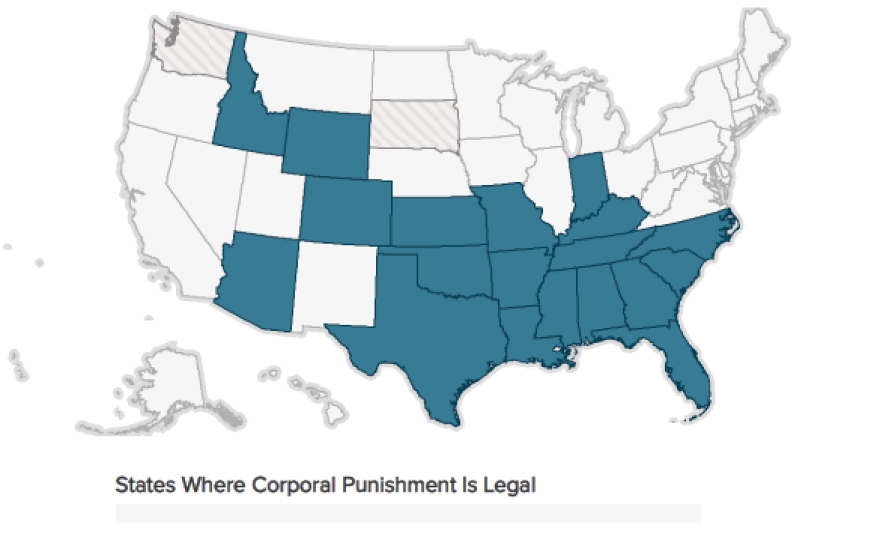There's a growing debate about the long-term effects of harsh school punishments, like suspensions, expulsions, and school arrests.
Research shows these methods of discipline can make misbehavior worse and contribute to the school-to-prison pipeline.
But when it comes to the school discipline discussion, something that is less talked about is corporal punishment – physical punishments like spanking or paddling.
Yes, this still happens in modern American schools. In fact, it was experienced by more than 109,000 students in more than 4,000 schools in the 2013-2014 school year, according to Education Week.
But that's a big decline from the more than 300,000 students who were physically disciplined in 2000.
Corporal punishment is banned in 31 states and Washington, D.C., but is still legal in 19 states – mainly in the South, Southwest, and Midwest. But reports of physical discipline still occur in states where it's legally banned, like Maryland, according to The Atlantic.

And policies vary between and even within states on factors like when it's used, who it's used on, the size of the paddle and what it's made of, and the number of strikes.
And there is little to no training for those administering the discipline.
Research has shown physical punishment can pose serious risk to children, leading to increased aggression, antisocial behavior, and mood and anxiety disorders.
Groups including the American Psychological Association, the American Academy of Pediatrics, and the American Medical Association have spoken out in opposition of the practice, and continue to call for a ban, citing harmful long-term effects of paddling on children and the need to keep physical violence out of the educational environment, according to AL.com.
The American Academy of Child and Adolescent Psychiatry said in a policy statement:
Corporal punishment signals to the child that a way to settle interpersonal conflicts is to use physical force and inflict pain. Such children may in turn resort to such behavior themselves. They may also fail to develop trusting, secure relationships with adults and fail to evolve the necessary skills to settle disputes or wield authority in less violent ways. Supervising adults who willfully humiliate children and punish by force and pain are often causing more harm than they prevent.
There are also disparities when it comes to who get paddled. Boys are paddled more often than girls, and minority students are paddled more than their white counterparts. Victor Vieth is the founder and senior director of the Gundersen National Child Protection Training Center. He told Education Week:
We know that in schools where corporal punishment is practiced, it's often on boys, minorities, and kids with behavior issues. We have this grave irony of hitting primarily boys, a significant percentage of whom have already endured maltreatment.

Efforts to ban corporal punishment in schools in recent years have been met with mixed success, according to The Atlantic:
Ohio and New Mexico banned corporal punishment in 2009 and 2011, respectively, but attempts in Louisiana and Texas both failed in the same years. In Texas, which ranks second in spanking students, lawmakers instead gave parents the right to exempt their children from corporal punishment with a signed waiver.
Amir Whitaker is an attorney at the Southern Poverty Law Center, who has studied the effects of paddling. He told AL.com:
It's a very convenient and knee-jerk reaction to discipline. And it does nothing but harm the child. All the research shows that, and all the experts know that. Research clearly says you're more likely to be aggressive if someone is aggressive with you. You're more likely to physically abuse someone if someone has physically abused you. As a society, we've acknowledged that bullying in schools should not be tolerated. Arming administrators and teachers with weapons and telling them it's okay to use their physical dominance on children, it's a form of bullying that shouldn't be tolerated. It sends a message that physical violence is an acceptable way to resolve conflict. In no other area is it acceptable to resolve conflict through violence. It shouldn't be tolerated in schools.
But not everyone believes corporal punishment is a bad thing. Mary Scott Hunter is a member of Alabama’s state Board of Education – a state that paddled nearly 19,000 students in the 2013-2014 school year. She told AL.com:
Proper corporal punishment isn't abuse, and we should be clear about that. We often see misbehavior in children that comes straight from the home, and I'd like to see some parents lined up and paddled for that. Habitual tardiness and truancy comes to mind.
For now, despite evidence against it, the practice remains.
You can check out a PBS NewsHour video about whether corporal punishment helps or hurts students below:
https://www.youtube.com/watch?v=JCBijpF0ZfE







